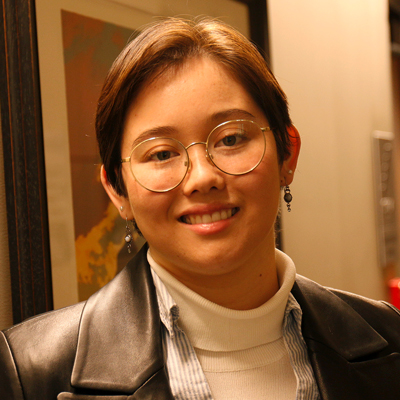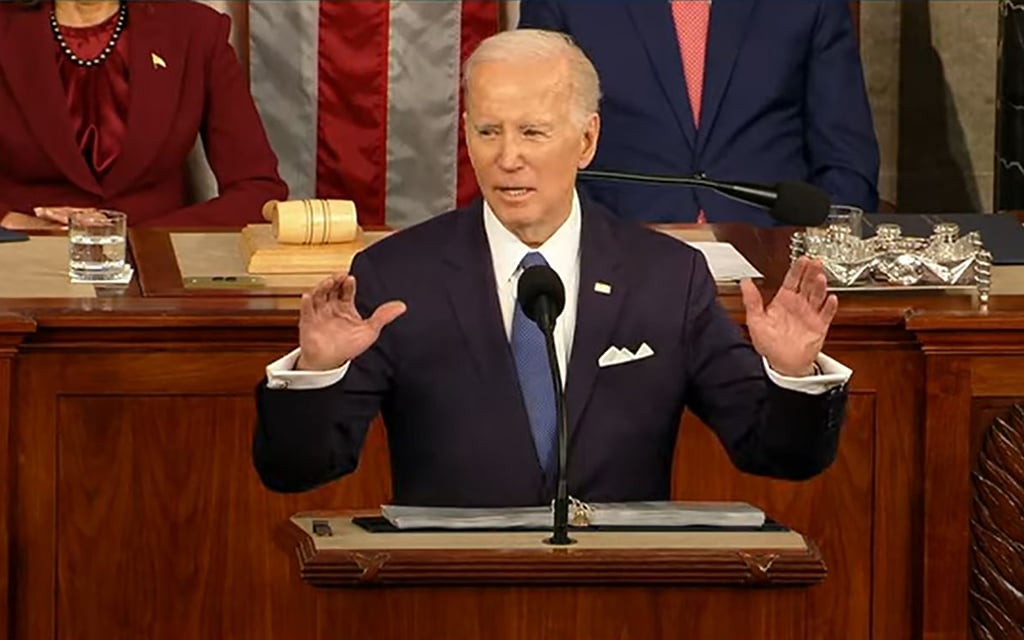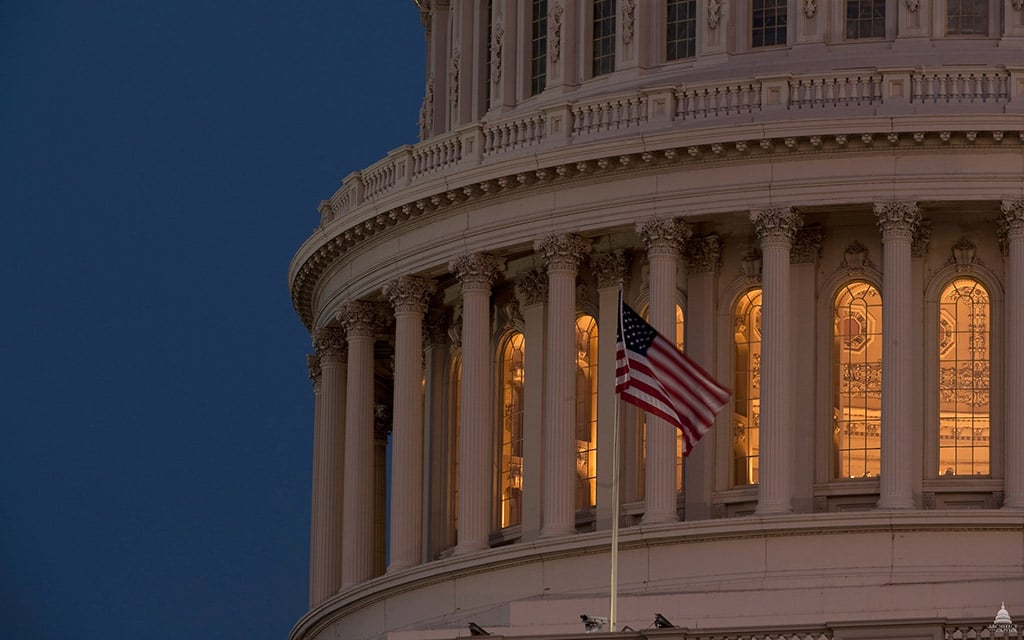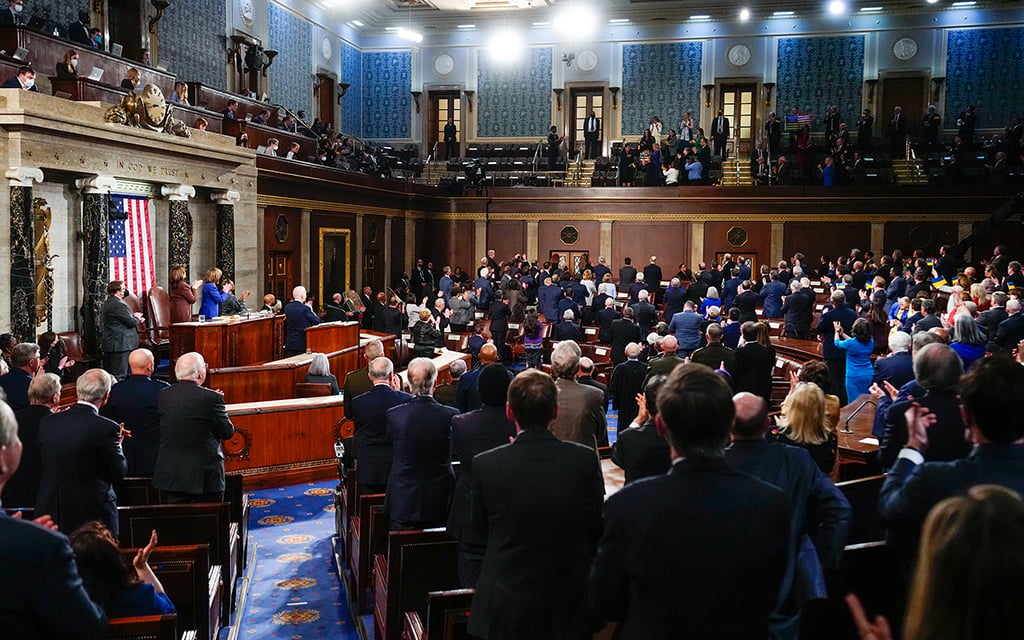
Congress applauds guests in the gallery during President Joe Biden’s 2022 State of the Union address. Two Arizonans will be in the gallery Tuesday as guests of the first lady for the 2023 address, and several others will be there as guests of Arizona members of Congress. (Photo by Adam Schultz/The White House)
WASHINGTON – A college student and a professional sports agent don’t share much in common, but two of them will share a seat in the House gallery Tuesday for the State of the Union address as guests of Arizona lawmakers.
Lindsay Kagawa Colas, the agent for Phoenix Mercury star Brittney Griner, and Arizona State University sophomore Amanda Van Flein are just two of the Arizonans who will be on hand for President Joe Biden’s speech as guests of state delegation members or of first lady Jill Biden.
The guests range from a college student to a college chancellor, from a business owner to a health care provider to two tribal leaders. Some are here as a personal favor, some to make make friends back home and most often to make a political statement related to the speech.
That is most apparent in the list of 25 guests who will be sitting in the first lady’s box, each of whom illustrates an expected element in the president’s speech. In a background briefing Tuesday morning, administration officials outlined the four pillars of the address: fighting cancer, supporting veterans, expanding mental health services and tackling the opioid epidemic.
The first lady’s guests will range from U2 lead singer Bono for his work against AIDS to Ukrainian Ambassador Oksana Markarova. The list also includes two guests from Arizona: Lynette Bonar, a Navajo health care provider who joined Biden in 2019 for the opening of the first cancer treatment center on a reservation, and Paul Sarzoza, whose cleaning and facilities services company, Verde Clean, is booming with the growth of semiconductor plants in the Valley.
“That’s become sort of a part of the formula for these State of the Union addresses, is that the president will point out certain folks in the audience for particular reasons to bolster points of the speech,” said Kyle Kondik, managing editor of Sabato’s Crystal Ball at the University of Virginia’s Center for Politics.
For lawmakers, the reasons behind the invitations are more mixed, said Erin Convey, a political analyst and reporter for Inside Elections. She said representatives usually bring guests they have a personal relationship with or those who will help “make a political point on a certain issue.”
“Sometimes it does have a politically motivated angle to it, and then other times you just have folks bringing people in their district who have been involved in some of these really big events recently in the news,” Convey said.
That appears to be the motivation behind Colas’ invitation from Rep. Greg Stanton, D-Phoenix. He sponsored a resolution urging the release of Griner, who was held in Russia for nearly 10 months on a drug smuggling charge last year after Moscow airport security found vape cartridges containing cannabis oil in her luggage.
Kondik said State of the Union guests can also be used by lawmakers to illustrate “an issue that they care about through personalizing it.” Sen. Kyrsten Sinema, I-Ariz., said she invited Gila River Indian Community Gov. Stephen Roe Lewis because of his “deep commitment to strengthening our water future in the face of historic drought.”
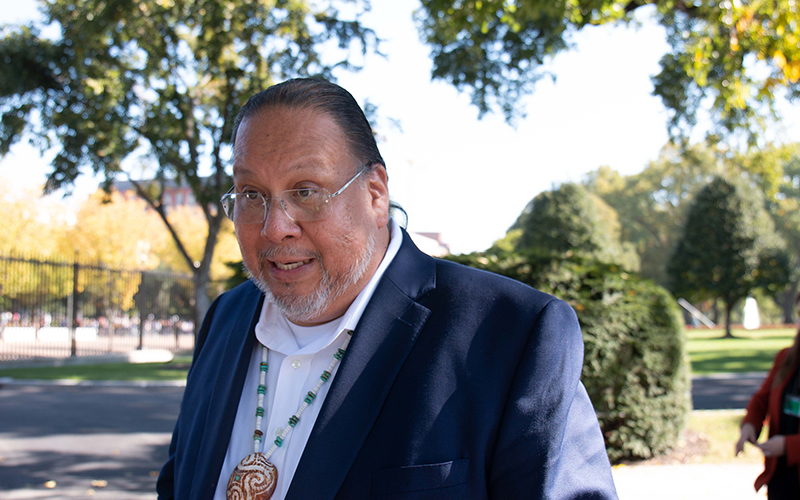
Gila River Indian Community Gov. Stephen Roe Lewis was one of three tribal officials invited to the State of the Union Tuesday by Arizona members of Congress or by first lady Jill Biden. (File photo by Ryan Knappenberger/Cronkite News)
“I’m confident that, with leaders like Governor Lewis at the table, we can build a broad, inclusive coalition of leaders equally dedicated to delivering lasting solutions and giving Arizonans peace of mind that our water supply is safe and secure for generations to come,” Sinema said in an emailed statement.
Another tribal leader – new Navajo Nation President Buu Nygren – will be on hand as the guest of Sen. Mark Kelly, D-Ariz., whose office said in a news release that Kelly invited Nygren because of their joint work toward tribal sovereignty and better living conditions for the Navajo Nation.
“Our goal is to build new and improved roads and economic opportunities for the Navajo people that will support jobs and basic water, power and broadband infrastructure across the Navajo Nation,” Nygren said in the release. “With the partnership of Senator Mark Kelly and our Congressional leadership, we continue our advocacy of federal initiatives that support tribal nations and a stronger Navajo Nation.”
For Rep. Paul Gosar, R-Bullhead City, the speech is a chance to make more of a personal than a political statement. Gosar has invited Amanda Van Flein, the daughter of his chief of staff, Tom Van Flein.
Van Flein said in an emailed statement that his daughter, who studies business communications and is a sorority member at ASU, told him she was “thrilled to be able to see the President speak in person.” Gosar said he has known Amanda since she was 10, and is proud to have her as his guest.
“It is a great opportunity for our youth to see the institution of Congress and gain an appreciation for the process, the pomp and the messaging,” Gosar said in the statement.
Other guests include Pima Community College Chancellor Lee Lambert, who was invited by freshman Rep. Juan Ciscomani, R-Tucson. Rep. Debbie Lesko, R-Peoria, identified her guest only as “a senior executive” from Taiwan Semiconductor Manufacturing Co., the plant whose expansion is driving growth of Sarzoza’s Verde Clean. And Rep. Raul Grijalva, D-Tucson, will not be bringing a guest, his office said. Other lawmakers did not respond to questions about their guests, or lack of a guest.
Convey said the guest lists work both ways: In addition to helping members make a point, appearing at the address can be an opportunity for “guests to promote whatever issue they’re advocating for and get more attention on whatever issue they’re involved in.”
Convey and Kondik agreed that while the guests may draw attention at the speech, they likely do not have much effect on policy in the long run.
“It is still a widely viewed event on the political calendar,” Kondik said. “But I don’t know if it’s much more meaningful than the representative sending out a press release or something.”
